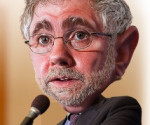Drowning in Keynesian fallacies
Whenever a Keynesian, be it Paul Krugman or even the original Keynesian, try to “refute” Say’s Law, they generally create a caricature or straw man, and then refute that instead of dealing with Say’s basic point. And Krugman does it again in a recent blog post, this time taking on Grover Norquist.
Krugman first takes a quote from Norquist:
The idea that if you take a dollar out of the economy and then — from somebody who earned it, either through debt, or through taxes — and give it to somebody who’s politically connected, that there are more dollars around, that if you stand on one side of the lake and put a bucket into the lake, and walk around to the other side in front of the TV cameras, pour the bucket back into the lake and announce you’re stimulating the lake to great depths. We just wasted $800 billion on stimulus spending that added to debt, that killed jobs.
Krugman then writes, “OK, this is just Say’s Law.” As one who has written much on Say’s Law, I ask, “It is?”
In dealing with what Krugman insists is a “fallacy,” first we have to remind people that Krugman actually believes that printing money CREATES real wealth, or at least it can lead to the creation of real wealth. When criticized, Krugman usually turns to the alleged “baby-sitting co-op” that “solved” its problems by printing more tickets. (You see, the “co-op” is supposed to be a perfect example of an entire economy with all of its complexities.)
Second, Keynes never “discredited” Say’s Law. Instead, Keynes created a caricature and refuted that instead, something Henry Hazlitt notes in his book, The Failure of the New Economics, which thoroughly refutes Keynes’ General Theory. Furthermore, in denying Say’s Law, Krugman is saying in effect that factors of production for purposes of economic analysis can be treated as homogeneous.
Thus, all it takes to get the factors employed is just a monetary or spending transmission, be it via government spending (which is what is “best” in a “liquidity trap”), or by having monetary authorities drive down interest rates. Under this interpretation, inflation does not have a distorting effect upon the economy but, instead, actually stimulates economic activity and creating new wealth.
Thus, what one produces is irrelevant as long as a government can print money. There is a problem, however, and that is that if all it takes is the “courage” to print money (and most governments ALWAYS have the courage to try to produce something from nothing), then Zimbabwe should be the wealthiest nation on the planet.
Krugman would argue that the U.S. Dollar is different, but if real assets mean nothing, or if all assets for purposes of economic analysis considered to be homogeneous, then it would not matter what was produced in the country represented by a particular currency. And as for Say’s Law and the Norquist quote, I would argue that Krugman’s next quote does not negate the truth of what Norquist is saying, but rather exposes Krugman’s fundamental ignorance of simple opportunity cost:
OK, this is just Say’s Law. We don’t know whether Norquist is honest enough with himself to realize that exactly the same logic applies to any spending, that according to his story anyone who borrows to spend, including companies making investments, is just displacing someone else’s spending.
In other words, everything is reduced to just “spending,” when, in fact, investment in a free market is profitable when entrepreneurs are able to move resources from lower-valued uses to higher-valued uses as ultimately determined by consumers.
In Wonderland, no such thing happens, as one “investment” is as good as another, since all that matters is spending. Thus, the Obama administration can throw hundreds of billions of dollars at solar energy, windmills, and ethanol and claim that it is “investing in America’s future.” Indeed, it is diverting resources from higher-valued uses to lower-valued uses and is destroying the economic future of this nation. Furthermore, we are finding that many of the companies receiving these massive subsidies are firms that have contributed money to the Obama campaign, which to me is utter corruption. Contribute to Obama, and have the president then loot taxpayers to throw good money after bad.
The key to understanding what Krugman is saying is to remember that he does not believe resources can be moved from lower-valued to higher-valued uses, at least economically speaking. It is all spending all of the time.
William L. Anderson is an author and an associate professor of economics at Frostburg State University in Maryland. He is also an adjunct scholar with the Mackinac Center for Public Policy as well as for the Ludwig von Mises Institute in Alabama.
Read more at “Krugman-in-Wonderland”














